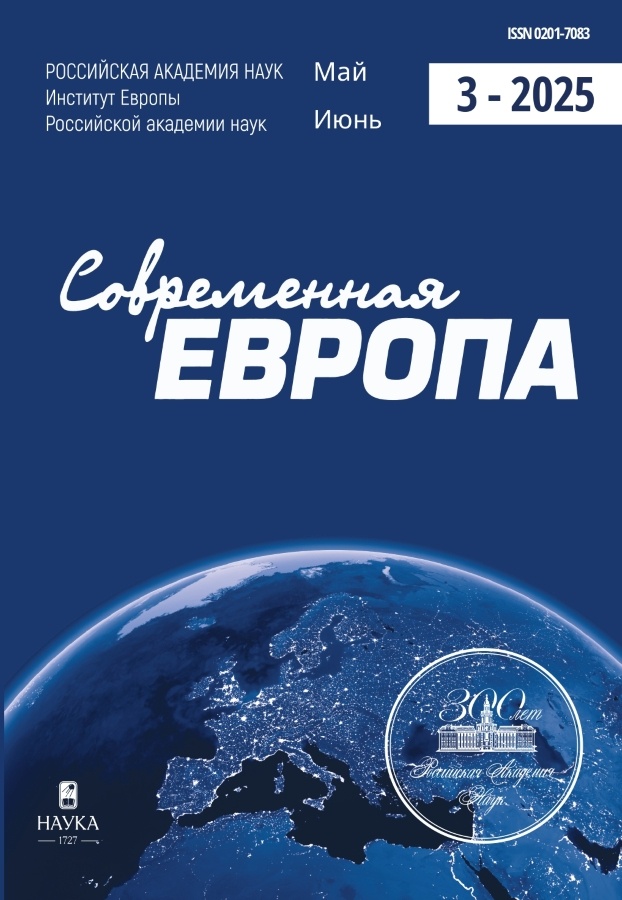A.A. Gromyko and Security Policy: Conflict of Strategies after Helsinki
- Авторлар: Sindeev A.A1
-
Мекемелер:
- Institute of Europe, RAS
- Шығарылым: № 3 (131) (2025)
- Беттер: 202-211
- Бөлім: HISTORY AND MODERNITY
- URL: https://medjrf.com/0201-7083/article/view/689119
- DOI: https://doi.org/10.31857/S0201708325030167
- ID: 689119
Дәйексөз келтіру
Аннотация
The article continues the study of the role of the Minister of Foreign Affairs of the USSR A.A. Gromyko in the formation, development and maintenance of security policy, its principles and structural elements. The subject of the article is the analysis and comparison of the strategies of A.A. Gromyko and the Western countries in 1976–1977 after the signing of the Helsinki Final Act. The article consists of three parts. In the first part, the author analyzes the strategic course of A.A. Gromyko and proves that the Soviet Foreign Minister understood détente as a three-level process. For this reason, he wanted to agree on the common content of détente and to build cooperation between states of different status in the system of international relations that would be beneficial for all participants. The second part describes the West’s strategic course. The author shows that the West hoped to weaken the USSR, lure the country into a foreign policy game, «keep the Soviets in good spirits» and obtain voluntary concessions from the country. The Helsinki Final Act was as a «provisional high point» that would lead to a fight for what had been achieved. In the third part, the positions of A.A. Gromyko and the Western political elite were compared. For the first time in historiography, the thesis about a real possibility of dialogue between the USSR and the United States on the legal formalization of the status of the great powers was presented. The author recommends taking into account the proposals of A.A. Gromyko in the modern system of international relations. The sources of the article are published documents of the Foreign Office of the Federal Republic of Germany, the use of which can be explained methodologically. It was important for the author to conduct the analysis on the basis of the foreign partners' assessment of the statements made by the Soviet Foreign Minister during official negotiations (outer reflection). The author's reasoning should be understood in the context of his earlier article in the journal.
Авторлар туралы
A. Sindeev
Institute of Europe, RAS
Email: a_sin74@mail.ru
Doctor of Sciences (History), Professor of RAS, Chief Researcher Moscow, Russia
Әдебиет тізімі
- Громыко Ал.А. (2019) Дипломатия позитивного действия. «Война между государствами – великое зло»: к 110-летию А.А. Громыко. Общ. ред. Ал.А. Громыко. Весь мир, ИЕ РАН, Москва. С. 84‒102.
- Gromyko Al.A. (2019) Diplomatiya pozitivnogo deistviya [Positive Action Diplomacy]. «Voina mezhdu gosudarstvami – velikoe zlo»: K 110-letiyu A.A. Gromyko [«War between states is a great evil»: On the 110th anniversary of A.A. Gromyko], ed. Al.A. Gromyko. Ves' mir; IE RAN, Moscow, Russia, pp. 84‒102. (In Russian).
- Громыко Ал.А. (2023) Европа между кризисом и стагнацией. Европа в глобальной пересборке: монография. Общ. ред. Ал.А. Громыко. ИЕ РАН. Изд-во «Весь мир», Москва. С. 13–25.
- Gromyko Al.A. (2023) Evropa mezdy krisison i stagnaziej [Europe between crisis and stagnation]. Еvropa v global'noj peresborke [Europe in global reassembly], ed. Al.A. Gromyko. IE RAN; Ves' mir, Moscow, Russia, pp. 13–25. (In Russian).
- Громыко Ан.А. (2009) Андрей Громыко: Полет его стрелы. Воспоминания и размышления сына. Научная книга, Москва. 444 с.
- Gromyko An.A. (2009) Andrei Gromyko: Polet ego strely. Vospominaniya i razmyshleniya syna [Andrey Gromyko: The flight of his arrow. Memories and reflections of his son.]. Nauchnaya kniga, Moscow, Russia. (In Russian).
- Загорский А.В. (2005) Хельсинкский процесс: переговоры в рамках Совещания по безопасности и сотрудничеству в Европе, 1972‒1991, Москва. 447 с.
- Zagorskii A.V. (2005) Khel'sinkskii protsess: peregovory v ramkakh Soveshchaniya po bezopasnosti i sotrudnichestvu v Evrope, 1972‒1991 [Helsinki process: negotiations within the framework of Security meetings and cooperation in Europe, 1972‒1991]. Moscow, Russia. (In Russian).
- Филитов А.М. (2023) 1970‒1972 и 1989‒1990 гг. в советско-германских отношениях: сравнительный анализ. Россия и современный мир. № 1. С. 137‒152. doi: 10.31249/rsm/2023.01.09
- Filitov A.M. (2023) 1970‒1972 i 1989‒1990 gg. v sovetsko-germanskikh otnosheniyakh: sravnitel'nyi analiz [1970‒1972 and 1989‒1990 years in the Soviet-German relationships: comparative analysis]. Russia and the modern world, 1, pp. 137‒152. doi: 10.31249/rsm/2023.01.09. (In Russian).
- Biermann H. (2012) U.S. Perceptions of the CSCE Process, in: From Helsinki to Belgrade: the first CSCE follow-up meeting and the crisis of détente, ed. by V. Bilandžić etc. V&R Unipress; Bonn Univ. Press, Göttingen. Р. 143‒162.
- Böcker C. (2010) Die Europäische Politische Zusammenarbeit – Struktur, Auftreten auf den KSZE-Verhandlungen, Mitwirkung bei der Schlussakte von Helsinki: Die aktive Teilnahme der EPZ-Staaten bei den KSZE-Verhandlungen und deren damit einhergehender Einsatz für die Menschenrechte haben zum Zerfall des Ostblocks beigetragen. GRIN Verlag, München. 17 p.
- Hildebrand K. (2012) The Cold War as Détente. The Phenomenology of the World Community of Nation States in the 1970s.From Helsinki to Belgrade: the first CSCE follow-up meeting and the crisis of détente. Ed. by V. Bilandžić etc. V&R Unipress; Bonn Univ. Press, Göttingen. Р. 25‒38.
- Kunter K. (2000) Die Kirchen im KSZE-Prozeß 1968–1978. Kohlhammer, Stuttgart. 262 p.
- Peter M., Wentker H. (ed.) (2012) Die KSZE im Ost-West-Konflikt: internationale Politik und gesellschaftliche Transformation 1975–1990. Oldenbourg, München. 344 p.
- Selvage D., Süß W. (2019) Staatssicherheit und KSZE-Prozess: MfS zwischen SED und KGB (1972‒1989). Vandenhoeck & Ruprecht, Göttingen. 757 p.
- Staden B. (1990) Der Helsinki-Prozess. Oldenbourg, München. 66 p.
Қосымша файлдар









